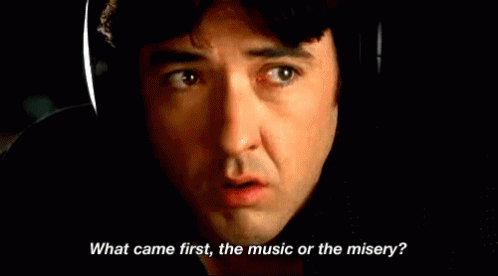Two of the best albums to ever play in my 1987 Honda Civic via my Aiwa CD player were suspiciously procured. I think if my parents ever found the original artwork of one of the CDs - I would probably never be allowed to purchase a CD again. Those two CDs were Dr. Dre's 2001 and Outkast's Stankonia. What they had in common - they were both copies of the original. They were both purchased in the high school parking lot, out of the trunk of a car, from a classmate. Each CD was $5. With his parent's wise and innovative purchase of a computer with a CD-RW drive, he suddenly had found a sustainable revenue source and minor celebrity. We had become digital pirates and bootleggers - in small-town Indiana.
My precious binder of CDs was no longer filled with the beautiful, immediately-recognizable artwork of classic 90s albums. It was now filled with silver and gold colored CD-Rs marked up with a Sharpie. What started out with single albums being copied quickly turned into precisely-mixed CDs. The days of taping off the radio were gone. In my opinion, Napster was at partially the reason for the decline of the music industry, but really - for a kid like me - it was the CD-RW burner drive. For the price of one CD, I could now have three. CDs were exchanging hands at my school like - well...use your imagination. You wanted a copy of the latest Limp Bizkit's release? - $5. Copies were everywhere.

This image above was suddenly the biggest purchase you could make - even if you did not have a rewriteable drive at home. You could take a few of these to a friend's house and you could look through his collection and "burn" your favorites. Computers were being built with more storage, rewritable drives, and Napster. Way before iTunes was launched, we knew that the need for a whole album was quickly fading away. The way we approached buying music was changing - or should I say not buying music. I had a copy of Jack Johnson's Brushfire Fairytales before it was even released.
Napster was quickly eroding away - the feds and Lars Ulrich were hot on the trail. A simple search for Tupac was no longer - you had to type in Toopac or 2Pac. Nine Inch Nails became 9 Inch Nails or 9 In. Nails. I was becoming a huge Barenaked Ladies fan and in order to get the tracks I wanted - I had to type it in as BaReNaKeD LaDiEs. The feds were catching on, but there were certainly workarounds. Spelling and letter arrangement was one. As long as T1 lines existed on campuses all over America - file sharing was alive and well. It did occur to me that stealing someone else's artistic work was wrong, but I never thought I would get caught. I have mentioned it in earlier posts, but my generation was certainly brought up in a world of digital piracy. A world our parents had no idea how to respond to. In that world, it was ok to take someone else's music without paying for it - Why? - because we enjoyed their work. I can remember people being upset with Lars Ulrich from Metallica due to his stance on Napster and file sharing. People revolting on Metallica??? I quickly heard about and moved on to Kazaa once Napster was shut down. Take a look at this Wikipedia page - the amount of file sharing sites/programs that launched between 2000-2002 is astounding. Once you had a taste for downloading what you wanted - it was tough to wash out.
It's amazing to reflect on the evolution of how we enjoy music. I love listening to the decade channels of SiriusXM each morning all because with a simple click I can enjoy six decades of music. The message of music has not changed, but the format we enjoy it in has undergone a tremendous evolution. Vinyl records to 8 tracks to cassettes to CDs to copied CDs to illegally downloaded songs to purchased songs on iTunes to streaming - it all has the same purpose - to fit your mood. And just like everything else, the pendulum always swings back. I now take immense pride in my vinyl collection and a fellow teacher and I were just marveling over his 8 Track collection the other day.
I wish I had that 87 Civic back (and the gas prices that came with it), but I do still have the majority of my copied CDs. For a person who remembers way too much - it is all about the memories within that silver Maxell. The immediate transportation to a time I cannot get back.
To conclude this post and to also humble myself - I fondly remember those CDs I created for others - namely girls I liked. A learning experience and a source of laughter and embarrassment. Nothing says I want (or more importantly hope) to be in a relationship with you like creating a CD with either what you perceive to be her favorites or ones that you think she'll like (bad idea). I leave you with one of my favorite quotes about mixtape creation from one of my all-time favorite books and movies - the quintessential High Fidelity.
To me, making a tape is like writing a letter — there’s a lot of erasing and rethinking and starting again […] A good compilation tape, like breaking up, is hard to do. You’ve got to kick it off with a corker, to hold the attention […], and then you’ve got to up it a notch, or cool it a notch, […] and . . . oh, there are loads of rules.

